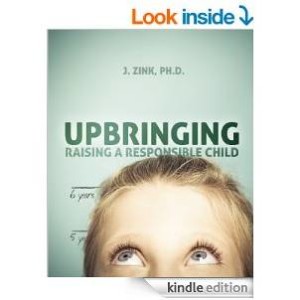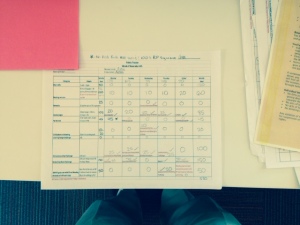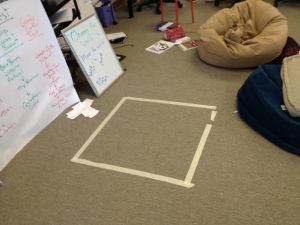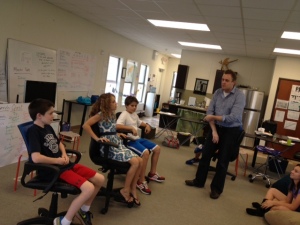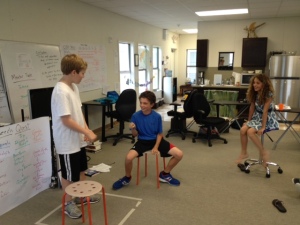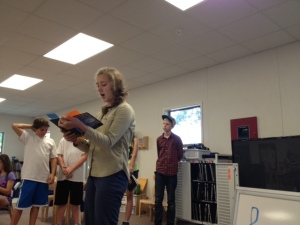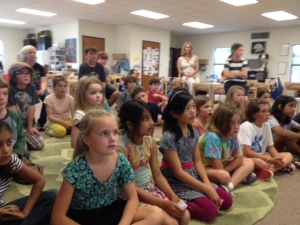It is not easy to be an Acton Academy parent.

Yes, you love the fact that your Eagle loves to go to school.

Yes, it’s nice to know that working hard and having fun are not mutually exclusive.
But it still can be difficult to believe that the most powerful way we can encourage deep learning is to relinquish control.
So here are seven principles recently sent to incoming middle school parents, to help ease the transition to a Learner Driven Community:
A Primer for
Acton Academy Middle School Parents
Acton Academy is a self governing Learner Driven Community where Eagles set individual goals, manage their own time and govern themselves.
Given that it can be frustrating for parents when Guides do not intervene to address concerns, but instead put this responsibility back on the Eagles, we thought a few principles might be worth restating:
Parents have the ultimate responsibility for each Eagle.
We believe our parents are the ultimate authority in their Eagle’s life. You pay the bills so you get to make the decisions. This also mean upholding Acton’s written promises to you is our highest responsibility and trumps even our promises to Eagles. Because of this, we respect your responsibility to set expectations for how much work your Eagle will do and how long it will take him or her to graduate to LaunchPad (high school.)
Eagles run our studios.
We trust your Eagle and give great latitude to our young heroes to practice self governance.
Allowing your Eagle to fail early, cheaply and often can be painful for parents.
It may be painful to see your Eagle struggling, whether it’s a tightly wound Eagle who needs to learn to relax or a slumping Eagle struggling to find the right motivation. Painful though it may be for all, we believe the lessons learned in our studio prepare our Eagles for glorious adventures in an even less forgiving real world.
Quality is judged by Eagles.
There are no grades at Acton Academy. We use real world standards instead.
All work approved by Eagles to count for a badge will either:
- Be “the best work I can do” if it is something being done for the first time; or
- Show improvement from previous work in a skills or area; or
- Be green-lighted (approved) by fellow Eagles as being worthy to represent Acton Academy quality work to parents or the public; or
- Be judged as high quality by outsiders in a public exhibition.
Interpersonal issues are addressed without adult intervention (unless it is a matter of safety.)
While Guides will listen to a parent’s concerns about interpersonal conflicts, we always will put the responsibility back on the Eagle to work out any problems, just like in the real world.
Eagles do receive frank anonymous feedback from their peers through periodic 360 surveys to help build stronger relationships and Guides will provide safe dispute resolution processes.
High community standards may result in an Eagle being sent home for a day. This is a serious message from the Learning Community. Under the current accountability system, an Eagle being sent home three times within a year will not be invited back. Your Eagle will understand these rules and has a responsibility to keep you abreast of any serious issues that may lead to being asked to stay home.
Eagles are busy so please limit outside communications.
Under the current studio rules set by Eagles, cell phone use is not allowed inside the studio, so email is the best way to communicate. If you need to text or talk, please set a specific time so your Eagle can pick up his or her phone and step outside. If you have an emergency, please email or text a Guide or Laura.
If you have a question about how Acton is working, ask your Eagle.
We believe in the power of customer feedback. If you want to know how school is going, ask your Eagle or read the blog or the weekly surveys. Out of respect for both you and your Eagle, Guides are not allowed to offer detailed feedback.
Eagles know what needs to be done. Each has a list of badges needed to move to Launchpad and the requirements for each badge. While we always are improving this system, your Eagle should know when he or she can expect to leave Middle School, given his or her current pace.
From time to time we will schedule a meeting in which your Eagle can present his or her Personal Learning Plan (electronic portfolios) and a physical portfolio of work. You also may want to review your Eagle’s progress on his or her Khan math plan or review Points Tracker sheets at the end of every week or session. As part of the Honor Code, Eagles are required to be truthful and transparent about their progress.
No, it’s not easy some days being an Acton Academy parent. But it is an exciting adventure.




